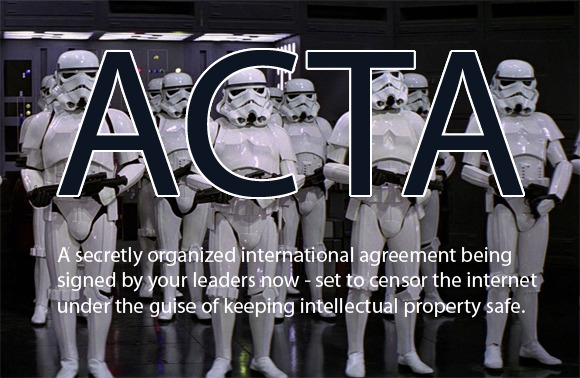Piracy Agreement ACTA Faces EU's Highest Court
This week the act known as the Anti-Counterfeiting Trade Agreement (ACTA) has been pushed before the European Union's highest court where it will face scrutiny by law. This move has been described by EU trade head Karel De Gucht as a question by the court that will clarify whether the treaty was able to comply with "the EU's fundamental rights and freedoms." What we know so far of the ACTA, for those of you following along, is that its a multi-nation agreement currently being signed (or protested against) after its initial negotiation excluded civil society groups, developing countries, and the general public on the whole.
The agreement has thus far been signed by 22 EU member states including the UK (and holds support from the United States, Japan, and Canada) and needs 6 countries to come into force. Protesters include Germany and Denmark and the agreement is set to be debated by the European Parliament in June. As the European Commission stated this week:
"[We have] decided today to ask the European Court of Justice for a legal opinion to clarify that the Acta agreement and its implementation must be fully compatible with freedom of expression and freedom of the internet." – EC

Though the agreement is being lauded by supporters as being put in place to raise global standards for intellectual property rights, opposition includes talk that blocking the internet in any form or fashion is the opposite of the basic freedoms that should be part of the European Unions defended rights. As Viviane Reding, the commissioner for justice, fundamental rights and citizenship, wrote this week in a statement:
This situation can and must not be changed by the ACTA agreement, which has been negotiated by the EU Presidency and is currently under public discussion in the European Parliament and in the national parliaments of the EU Member States. As I said, I am against all attempts to block Internet websites. Even though the text of the ACTA agreement does not provide for new rules compared to today's legal situation in Europe, I understand that many people are worried about how ACTA would be implemented. The European Commission has therefore decided today to ask the European Court of Justice for a legal opinion to clarify that the ACTA agreement and its implementation must be fully compatible with freedom of expression and freedom of the Internet." – Reding
We'll continue following this agreement, I assure you, as it has the ability to turn into something much greater than a clarification of rules. Blocking the web via internet providers is never the answer, ladies and gentlemen, and any act that may lead to such a law should rightly be struck down.
[via BBC]
